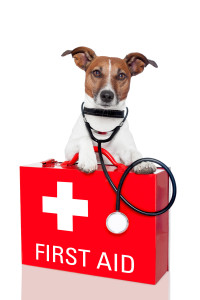It’s not if you will have an emergency with your dog, but when – Are you prepared? Not being ready could cost your canine his life, so be sure you have the proper items on hand and know what needs to be done should you find yourself in an emergency situation.

Emergency Information
Time is of the essence when it comes to an emergency – one minute could be the difference between saving and losing your beloved pet. Make sure you keep this important information on your fridge, in your phone, and in a notebook in your car, so you always have the information.
- Name, phone, and directions to your own vet
- Name, phone, and directions to nearest 24-hour Vet Clinic
- Pet Poison Helpline Number – 800-213-6680 If you have an iPhone, they also have an app (http://www.petpoisonhelpline.com/2012/04/new-iphone-application-and-mobile-enabled-website/)
- Phone Numbers of people you can call to help if needed (for rides, caring for other pets, contacting your work, etc).
- List of common poisons
- List of dog’s current medications
- Lists of dog’s known allergies
Emergency Kit
The Pet Poison Helpline recommends the following for your home pet first-aid kit for poisons. They caution, however to not administrate anything to your dog at home without first speaking to a toxicologist or veterinary professional. For example, sometimes you should NOT induce vomiting.
- Hydrogen peroxide 3% (within the expiration date)
- An oral dosing syringe or turkey baster (for administering hydrogen peroxide)
- Teaspoon/tablespoon set (to calculate the appropriate amount of hydrogen peroxide to give)
- Liquid hand dish washing detergent (i.e., Dawn, Palmolive)
- Rubber gloves
- Triple antibiotic ointment (with NO other combination ingredients – NOT for use in CATS!)
- Vitamin E oil
- Diphenhydramine tablets 25mg (with NO other combination ingredients)
- Ophthalmic saline solution or artificial tears
- Can of tuna packed in water or tasty canned pet food
- Sweet electrolyte-containing beverage
- Corn syrup
- Vegetable oil

